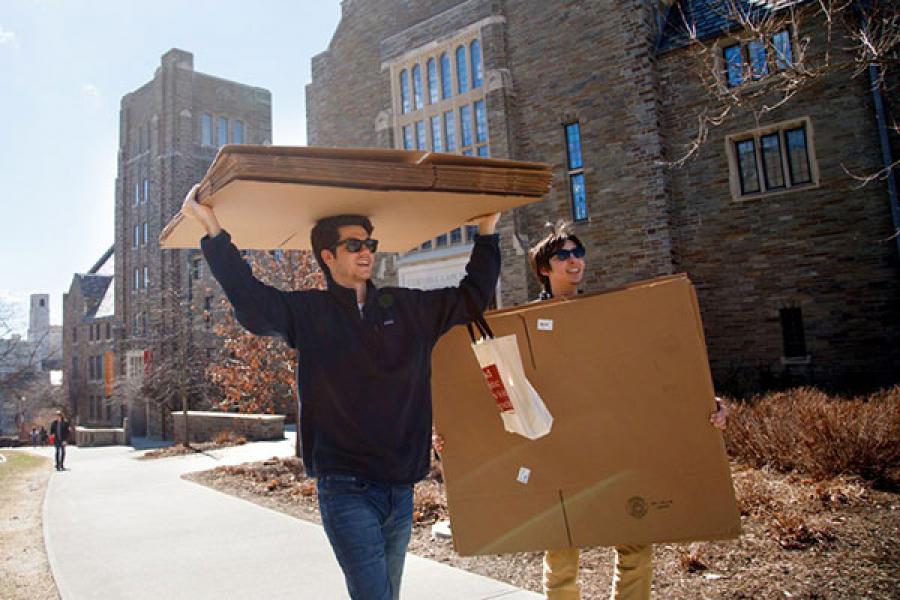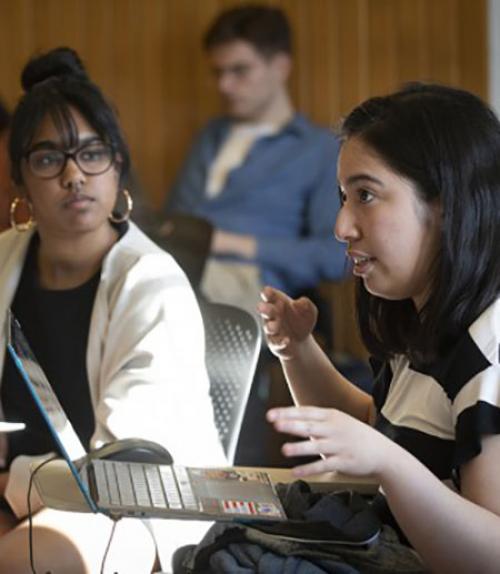Image: Peer-to-peer counseling volunteers receive training on how to support students in need. Credit: Jason Koski/Cornell University
After Cornell’s March 10 announcement that it would move to virtual instruction due to the coronavirus, Manisha Munasinghe circulated a spreadsheet on Twitter inviting fellow graduate students to help undergraduates grappling with the transition.
When she checked the Google document the next day, she was stunned: More than 100 graduate students and university staff had volunteered support, offering spare rooms and couches, basement and attic storage space, and rides to the grocery store or airport – even help caring for plants.
“I’ve never seen such a quick response,” said Munasinghe, a Ph.D. student in the field of computational biology and student-elected member of the Cornell Board of Trustees. “It was really impressive to me how quickly they had come out to support the undergraduate community.”
As Cornell leadership works around the clock to respond to the COVID-19 pandemic, the university and its students have rallied to help classmates cope with an unprecedented and stressful disruption to the semester.
They are helping to book flights home and move belongings. They are contributing to a fund assisting students under financial strain. They are offering peer-to-peer and professional counseling.
On March 13, President Martha E. Pollack announced a two-week suspension of classes and urged students to accelerate returns home that had been planned for spring break. Ryan Lombardi, vice president for student and campus life, said the university recognized that travel was growing more difficult, and students were struggling to juggle studies and sort out travel and living arrangements.
“This past week has created extraordinary strain on our entire campus,” Lombardi said in a message to students. “These are truly exceptional circumstances, and it is gratifying to see our community come together as we have. Please continue to take care of yourselves and support each other.”
Lombardi announced that students who leave on-campus housing by March 29 will receive housing and dining rebates, and that the university will arrange storage space at no charge. Some students have requested exemptions to stay on campus; some will remain in off-campus housing.
Students carry boxes from Collegetown back to their dorms on West Campus in preparation for moving off campus. Credit: Jason Koski/Cornell University
Sharon McMullen, assistant vice president of student and campus life for health and wellbeing, said Cornell Health has fielded concerns from students about COVID-19 and the major disruption to their studies. Cornell Health is exploring opportunities and best practices to expand remote services, potentially including direct medical and mental health care via phone and video visits.
In the meantime, McMullen said, simple kindnesses – from sharing hand sanitizer to holding doors open – will go a long way.
“If you’re staying on campus, ask your friends who are moving out how you can help,” she said. “Reach beyond your immediate peer group to support others who may be stressed or struggling.”
Many students are already doing that. The Office of the Student Advocate, an office of the Student Assembly, has fielded numerous questions about everything from travel and storage to help contacting professors about study extensions or other special accommodations. The office created infographics to help steer students to various resources related to housing, mental health services and financial aid.
On March 13, the office led training for peer-to-peer counselors volunteering to assist classmates in the coming weeks, either in person or remotely.
“I’m so proud of the students I work with, because everyone is just coming together right now,” said Liel Sterling ’21, the student advocate. “Just an amazing amount of support for other students, so that’s been really heartening.”
The office has referred many inquiries to the Access Fund, which can provide up to $500 to help offset unexpected expenses incurred by having to leave campus unexpectedly and transition to virtual learning. Sterling said the fund helped one student book a flight home to Texas.
The Student Assembly and other student organizations have contributed more than $150,000 to the Access Fund, marshalling student fees no longer needed for activities that have been canceled, including Senior Days. The senior class campaign redirected its Giving Day mission to support the fund, which is administered by the Office of the Dean of Students through the First-Generation and Low-Income Student Support.
Separately, the Student Assembly has worked to arrange more charter buses to Syracuse Hancock International Airport at a reduced cost, and potentially also to airports in Buffalo and Philadelphia.
Nate Rogers, a Ph.D. student in the field of mechanical engineering who joined Munasinghe’s spreadsheet, will drive one student to Ithaca Tompkins International Airport. He’ll help another move a minifridge and other heavy items into storage, after securing a friend’s Jeep for the job.
As a teaching assistant, Rogers also must navigate the transition to virtual instruction and office hours. He already collaborates remotely with researchers across the country. But as an Ithacan since 2013, he said he and many other local residents felt a strong desire to provide a bridge between campus and community during a time of need.
“We’re all part of the same Cornell community,” Rogers said. “It feels good to be helpful at a time like this.”
Read this story in the Cornell Chronicle.





